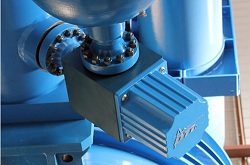- Home page /
- New technologies and equipment /
- New riser recoil valve design improves performance, safety
New riser recoil valve design improves performance, safety
 |
| Courtesy of dtillc.com |
DTI, LLC has introduced a new riser recoil valve that offers a reliable option during planned or emergency riser recoil events. The patent-pending design behind this new technology significantly improves riser recoil valve performance. The system has fewer moving parts than competitive valves, which eliminates risks for malfunctions and leads to greater reliability and easier maintenance.
With offshore drilling moving into ever-deeper waters, fast and dependable solutions for controlling riser recoil in wireline and direct-acting tensioner systems are critical. The role of the riser recoil valve is to regulate the fluid between the accumulator and cylinder to control rod extension, making it a vital safety component.
During normal operations, the valve remains completely open. When a riser recoil or wireline/riser parting event is introduced, the valve closes accordingly to limit the flow of fluid and control extension of the cylinder rod, reducing the possibility of damage to the vessel, risers and wellhead systems.
The streamlined design of the DTI valve greatly improves flow efficiency, directly and positively impacting the system’s response time. Function tests performed on the DTI riser recoil valve produced a near-instant response time, from fully open to fully closed, which improves overall safety as the risk of damage caused by a riser recoil event or wireline/riser parting is significantly reduced.
David Trent, president and CEO of DTI, stated that, “The DTI riser recoil valve is the most current and advanced design available. It provides the most efficient control solution, which is reliable, reactive and easier to maintain. As the industry standardizes with this riser recoil solution, we will see a positive change in the planned and emergency disconnect operations and safety.”
The DTI riser recoil valve operates in all modes of operation, and it can be installed to improve performance on existing drill ships as well as new builds.
Source: worldoil.com

